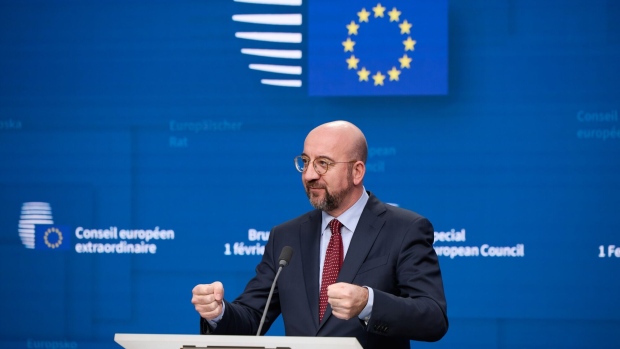Apr 17, 2024
EU Leaders to Urge ‘Paradigm Shift’ to Reverse European Decline
, Bloomberg News

(Bloomberg) -- The European Union’s waning clout versus major geopolitical rivals is sounding alarm bells in Europe’s capitals, compelling leaders to discuss a radical transformation to boost the bloc’s competitiveness in a hostile world.
That has led some capitals to push for fast-tracking policy prescriptions that have been long in the gestation — like bringing European markets closer together — as well as finding a way to issue more joint bonds to boost industry and defense.
“In light of geopolitical tensions and more assertive policy measures taken by international partners and competitors,” said the draft conclusions of the EU summit seen by Bloomberg, “Europe needs an urgent paradigm shift.”
European countries have stepped up their work on security and industry as leaders become increasingly concerned that they’re frittering away their competitive edge to American and Chinese firms. Wars near and far, the looming possibility of another Trump presidency, and their dependence on others for energy and critical materials are all jangling European nerves.
There is agreement on the fact EU members face “huge and very difficult challenges,” said European Council President Charles Michel, who’s chairing the two-day summit that starts Wednesday. But some leaders went into the Brussels gathering expressing palpable impatience at the gulf between the consensus and any action commensurate with those threats.
“Some sort of joint borrowing to finance a new European defense fund that will purchase European equipment for common European security needs is a discussion that needs to take place now,” Greek Prime Minister Kyriakos Mitsotakis said last week in preparation for the summit.
Polish Prime Minister Donald Tusk last week called for a “revolution in attitude.”
“Europe has to become the strongest political entity in the world as it has all the possibilities to do so,” said Tusk, who not long before his return to domestic politics held Michel’s role.
EU heads of state and government over the two-day gathering will discuss policy proposals that may include removing barriers to mobilizing private investments for clean tech and defense as well as the possibility of issuing joint EU debt for military spending.
In raising €800 billion ($850 billion) for a post-pandemic recovery fund, EU leaders defeated longstanding opposition from more fiscally conservative members. Some urge a new round of joint borrowing to tackle today’s challenges, from the climate transition to supporting Ukraine against Russia’s aggression.
Countries including Germany and The Netherlands insist the Covid response remain a one-off. But the existential threat represented by Russia’s war in Ukraine — which is not moving in Kyiv’s favor — could prompt even Berlin to set aside its concerns surrounding EU debt, according to a senior official who was attending International Monetary Fund meetings in Washington this week.
But that would require a dramatic turn from the so-called frugal countries. Last month during a separate summit, Scholz rejected the possibility of including a mention of joint borrowing in the conclusions on how to finance defense, Bloomberg reported.
Other policy proposals in a report to be discussed at this week’s meeting include consolidation for telecom operators, the sharing of investments in key network elements or joint purchases of critical minerals.
“The access to capital for our companies is much worse than it is for American companies in their market so we have to work on the capital markets union to work to be able to leverage,” Estonian Prime Minister Kaja Kallas told reporters Thursday.
This week’s summit comes as top EU officials consider their priorities for the fresh mandate they hope to gain after European elections in June. Euroskeptic far-right parties are expected to gain ground in the vote.
“The sense of this European election is: change the leadership!” said Hungarian Prime Minister Viktor Orban on Wednesday, who has clashed with EU partners over rule-of-law issues. “This leadership of the European Union is bad, it has failed.”
Others posed a more pro-EU view. “The problem is that we are not prepared,” said Poland’s Tusk. “Europe must become a political and military power if we want to feel safe on our continent.”
--With assistance from Natalia Ojewska, Sotiris Nikas, Daniel Zuidijk, Ben Sills, Katharina Rosskopf and Megan Howard.
(Updates with Estonian prime minister comments in the 14th paragraph.)
©2024 Bloomberg L.P.







